Phone: 1-306-450-3144
Email: info@africagoodgovernancenow.org
Kenya now ranks number 30 of the most corrupt countries. According to the Transparency International's annual corruption index Kenya’s corruption has only increased. Kenya now ranks 145th out of 174 nations, down from 136 in 2013. Only 1.2 per cent of government expenditure in 2014 could be properly accounted for. The Government could not satisfactorily account for Ksh.450 billion of the budget. Corruption analysts John Githongo argues that Kenya’s corruption have reached a scale of looting that surpasses anything Kenyans have seen before. Under Moi Kenya lost $1billion through the Goldberg scheme alone. Under Kibaki, several corruption deals saw the looting of public funds in grand scale particularly the Anglo Leasing. Githongo notes that the current Jubilee Government headed by Uhuru Kenyatta and William Ruto, “…isn't going to have one Goldenberg or one Anglo Leasing, we have got several going on at the same time in different departments".
Every year Kenya loses more than 30% of its revenues - ranging between Ksh.300billion-340 billion and now Ksh.450billion in 2014. Looking at this trend and given that the same corrupt leadership and system are still governing Kenya, revenue losses will increase to between Ksh.500billion- 700billion in the next few years. Since Independence, Kenya may have lost close to Ksh.100 trillion both in cash and lost opportunities. In the last 15 years alone, Kenya has lost a total of Ksh.4.76 trillion. If well tabulated, these cash would have: employed 2million Kenyans per year; build 290 advanced hospitals (one in each constituency - each equipped with radiotherapy machine, MRI machine, 2 CT scan machine, etc); constructed 400,000kms of road; build 12,000-100,000 factories. No Kenyan will be jobless today.
The Good Governance Team Kenya (GGT-K) is fully aware and knowledgeable of all methods and ways corrupt cartels and State leaders use to siphon away public funds. The Team has developed 20 unique and air tight (more than water tight!) methods to counter corruption. The GGT-K will seek to bring corruption down to zero. No tax-payers money should be lost to corruption. This is why those selected to the GGT-K will have been vetted thoroughly to ensure no one has in the past been engaged in corruption nor will he/she do so once in power.
Watch these links:
- Corruption in Kenya is sliding out of control, veteran anti-corruption activist John Githongo warns
- The real cost of corruption and how much Kenyans have lost
- CorruptionCentral: Is Kenya losing the fight against corruption?
- Kenya is the verge of facing financial adversity as corruption takes toll on the country
- Corrupt policemen perfect the art of taking bribes
- Graft Diaries: The State House petrol station that never was
- Newspaper -SUNDAY, AUGUST 2, 2015 - Corruption in Kenya 'worse than ever' says veteran campaigner John Githongo
- Francis Atwoli; Usisadi unamaliza nchi ya Kenya
- Maize scam dealers unmasked
Kenya’s education faces many challenges. Some students learn under trees due to lack of class buildings. They lack text books and note books, pencils, etc. Millions of pupils walk long distances to school. Many pupils from different grades are forced to share one classroom facing opposite directions. Many schools are mud-walled with rough floors. Many lack doors and windows. The schools are hardly maintained. Very few schools exists for children with special needs. The teacher-student ratio is overwhelming. Teachers are heavily overworked yet poorly paid. Pupils also do not get high quality education. About 900,000 pupils finish primary schools but less than 50% graduate at secondary level. Lack of school fees has been the hindrance for poor children proceeding with education beyond Class 8. Worse very brilliant students do not proceed with learning for luck of fees. The situation is worse at college and university levels. Since all students here have to pay college/university fees, brilliant children of the most poverty-stricken families hardly make it there. Many poor families end up selling all their most valuables assets like land, plots, houses, etc to educate their children who upon graduation hardly get jobs hence both the parents/families and the graduate end up in unimaginable cycle of poverty.
While so much sufferings ail the education sector, corruption is rife everywhere. Kenya loses 40% of its GDP to graft every year. Donors gave millions to support Kenya’s free education system etc. Much of this money was stolen by the leaders. The UK and Canada demanded a refund of their $78 million and $2million respectively. Thus looting of educational funds has undermined delivery of high quality education to Kenyan students and the expansion of free education to secondary and tertiary institutions.
GGT-K will seek the implementation of about 30 Actions. This shall radically change Kenya’s educational approach in a manner never seen for the last 30 years or since independence. These measures shall for example see a massive expansion and enrolment of secondary and tertiary education levels, high quality education whose credentials are recognized worldwide managed by a highly motivated professional teaching workforce. The welfare of teachers, lecturers, and professors shall be central in this scheme. It shall seek to have Government undertake deliberate measures aimed at improving education situation of the marginalized regions of Northern Kenya including ensuring all students who sat the KCPE classes joined Form One class. Greater support shall also be provided to counties with low post-primary school enrolment such as Counties at the coastal region. Major support measures shall be accorded to girls without neglecting the boy child.
See Links
- Missing millions puts Kenya education at risk
- Hali mbaya ya shule za msingi katika kaunti ya Homa Bay
- In Kenya, a new kind of classroom
- The Turkana School Under A Tree
- Samburu children school
- Marsabit mobile school helping to boost literacy levels among nomadic communities
For many years, Kenyan media operated under very harsh environment. Journalists were beaten, arrested, detained, tortured, maimed, and even killed. Although the situation improved, the dark cloud hanging over the freedom of press has not been fully extinguished. And it has crept back with a big bang. In the last two years the current Government has passed laws that have far reaching effects on Kenya’s media freedoms, access to information and material reporting. The Kenya Information and Communication (Amendment) Act and the Media Council Act, effectively silences critical press reporting via newly-established government-controlled regulatory body and draconian hefty fines to be imposed on an individual journalist. Journalists are to be fined as much as Ksh. 500,000 (US$5,500) while media companies will be fined up to Ksh. 20 million (US$230,000) if these government-controlled body finds them in breach of government-dictated code of conduct. Another law is the Security Laws passed in December 2014 in an acrimonious session in parliament where opposition MPs were beaten and injured inside the parliament chambers. Parliament has voted to ban free press parliamentary reporting. The Military Bill will pose a major challenge to the press. Several journalists have recently been killed or died in very unclear circumstances. They all had been threatened with death for reporting on issues that had negative effects on the current government. Dozens of journalists have been detained by police, harassed, beaten and badly injured as well as their cameras confiscated by Government authorities. Freedom gains are being eroded quite fast.
The Good Governance Team-Kenya (GGT-K) views the press as an important segment in the overall governance process of a country. Journalists are another eye and ear of the society. They contribute immensely to the development of society through reporting and unearthing major and minor corruption, maladministration, human rights abuses, evil and criminal acts by leaders and all ills in society. GGT-K shall advocate for the media to be accorded highest protection and support to enable the media go about it’s duties however critical the media reports may be. Media tasks must be seen to have some convergence with Government goals such as fighting corruption, wastage of public resources and ending misdeeds by public officials. Media should be rewarded not punished when they unearth mega or small but many- corruption deals. Laws that oppress Kenyan media should be done away with.
See Links on Media Woes in Kenya today:
1.Kenyan reporter, 27, found dead in his home
2.Journalist's murder prompts fears for press freedom in Kenya
3.Kenyan editor murdered by unknown assailants in Eldoret town
4.Kenyan police assault journalists investigating corruption
5.Broken promises - How Kenya is failing to uphold its commitment to a free press
6.Kenya - Kenya and its press freedom commitment
7.Kenya falls short on promises for press freedom
8.Journalists Attacked: MCA attacks, injures Nation Nyeri bureau journalist
9.Journalists assaulted and arrested for doing their job in Busia
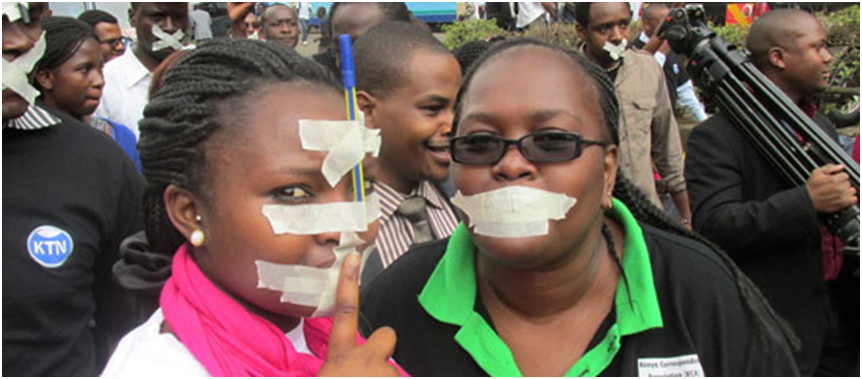
Courtesy of cpj.orgJournalists say they are routinely threatened, intimidated, and even attacked, and that government authorities are the culprit more often than not
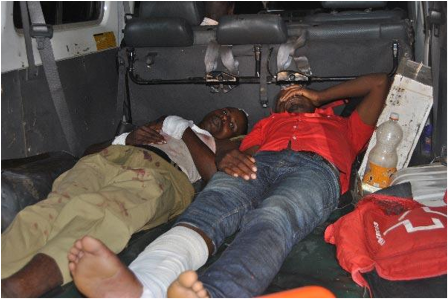
Courtesy of www.the-star.co.keCitizen TV journalist Reuben Ogachi and a Tana River county driver lie in a Kenya Red Cross Society ambulance after they were allegedly attacked by General Service Unit police.
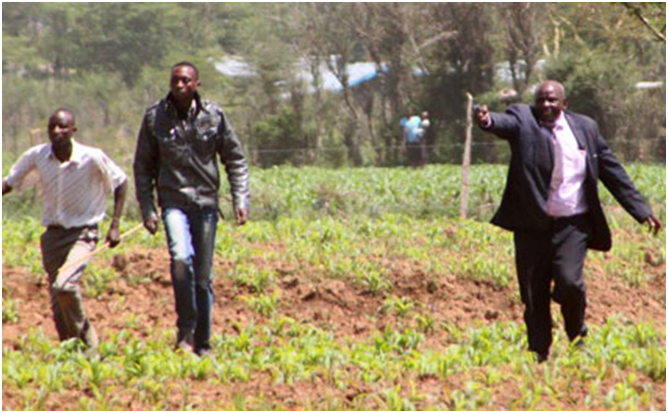
Courtesy of: in2eastafrica.net -ODM official attacks journalists
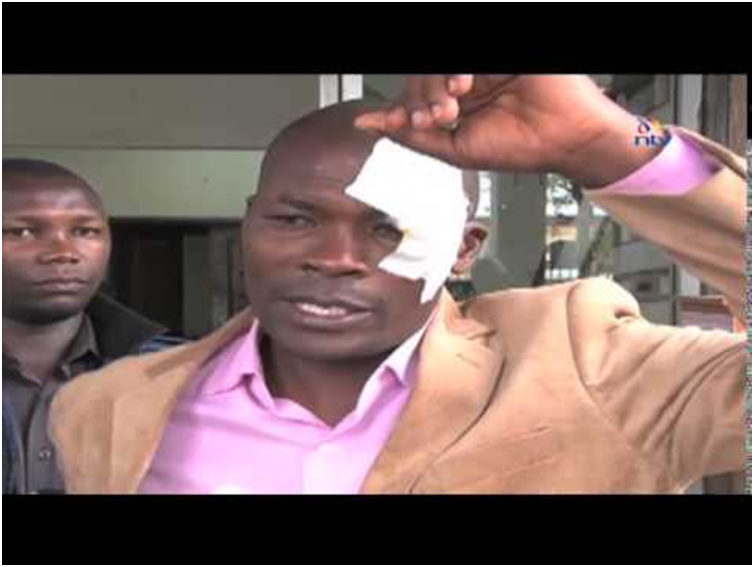
Courtesy of: www.youtube.comJournalists Attacked: MCA attacks, injures Nation Nyeri bureau journalist. NTV Kenya
The last time ethnic violence was witnessed in developed countries was several centuries ago. Today’s Kenya experiences deadly tribal and clan wars. These wars have in many cases been very brutal and ferocious. The fight occurs along political, economic or cultural fault lines or simply hatred of the “other”. The level of animosity has been on the rise since 1992. In North Eastern Counties, ethnic fighting has taken clan and tribal angle often with deadly results between the Degodia, Garre, Borana, Garba, etc . In Samburu, Nyanza/ Kericho, Turkana, Baringo and West Pokot, it has been inter-tribal warfare. The Turkana, Pokots and other Baringo communities have been slaughtering each other. The consequences have been shocking. Hundreds are killed, tens of thousands of livestock stolen and entire villages razed to the ground. These has been the trend since independence 53 years ago.
The Good Governance Team knows this problem can be avoided and permanently ended. It will seek the implementation of 20 measures that will end ethnic and clan fighting once and for all.
See the You Tube links below:
- 2 killed in Tana River clashes
- 38 killed in renewed Tana River clashes
- No Sign Of Life In Kapindasum Shopping Centre,Baringo
- Analysis Of The Baringo Killings
- Mary Ekai: Baringo killings are not about cattle rustling but natural resources
- At Least 5 People Dead In The Kericho, Kisumu Clashes
- Border clashes result in 5 deaths, burning of more than 20 houses and displacement 100 families
- 10 Killed in Fresh Attacks in Moyale
- Renewed inter clan clashes reported today in parts of Moyale town
- Moyale Clashes Update
- Mandera Attacks: Over 10 people killed in inter-clan fighting
- Inter-clan clashes in Arabia, Mandera leave 9 herders killed, 6 others injured
- 14 Killed in Mandera Attacks
- Kenya's Wild West Part 1
- Kenya's Wild West Part 2 Pokot-Turkana conflict
- The Wild West Part 3: Osteoporosis in Turkana
- Kenya's Wild West part 4:Turkana's network woes
The current – Jubilee Government has rolled back the gains that the Kenya civil society had made over the decades. The liberties enjoyed by Kenyans today was a result of a painful struggle by the civil society. But today draconian measures have been taken by the current government that severely cripples the civil society and the wider NGO fraternity. In 2014, the Government banned about 510 NGOs. The Government including the President has persistently attacked the civil society organizations in Kenya. The International Centre for Policy and Conflict describes the current situation as follows: “that the current regime is intolerant and is alarmingly shrinking the space of civil society by attempting to hinder their access to funding, profiling and blacklisting prominent human rights organizations in Kenya… Civil society workers are being harassed, attacked, and even murdered to stop them from carrying out their work and to intimidate others from pursuing similar efforts to stand up for citizens’ rights or take on entrenched socio-political and economic interests that are depriving Kenyans of their dignity and access to quality services… Since its election in 2013, the Jubilee regime has led a smearing campaign against human rights NGOs and is striving to gain control over them or silence them... The Jubilee government is deliberately reducing the room for operations of human rights NGOs, known for being critical of its policies.... By labelling human rights groups as ‘terrorism agents’ acting against national interest, President Kenyatta government is acting in ways known of authoritarian regimes”.
NGOs and the wider civil society is critical in Kenya’s political, economic, social, democratic and human development. They link with grassroots communities and reach areas where Government is sometimes unable to reach. The Good Governance Team-Kenya (GGT-K) will work very closely with NGOs. It shall advocate for the formation of a Development Partnership in a Structured Framework of Cooperation between the Government and the NGO fraternity. NGOs right to seek funding from abroad for the development of the people should not be curtailed. NGOs should be accorded greater protection and whatever support they seek to help them develop the country. The Government should hold an Annual Consultative Meeting with the NGOs and civil society in a frank atmosphere to review the partnership and chart the way forward. Government should not resort to brutal ways of dealing with NGOs however critical they may be of Government policies. NGOs should be encouraged to provide critique of such policies to enable Kenya have a strong foundation base.
See Links
- President Uhuru, Jubilee regime should stop vicious attack on civil society in Kenya
- Kenya NGOs listed in probe say the government is 'soiling the names of institutions'
- Foreign-funded NGOs in Kenya feel the heat
- In Kenya, averting a move to strangle civil society with the financial noose
- Why Uhuru, Ruto must not be allowed to kill civil society
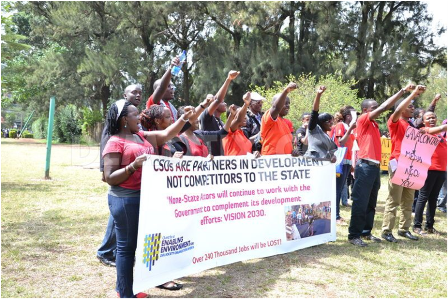
Kenya: Protests held by Civil Societywww.demotix.com
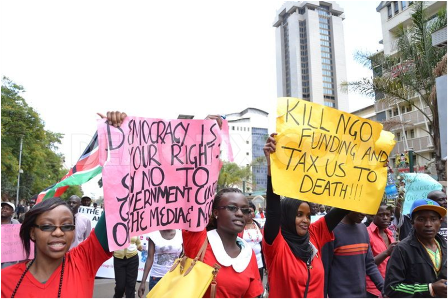
Kenya: Protests held by Civil Societywww.demotix.com
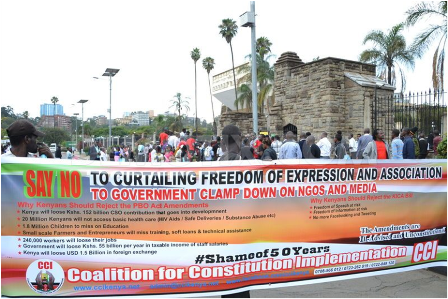
- Kenya: Protests held by Civil Societywww.demotix.com -Civil activists demonstrating outside the Kenyan parliament last November over two bills they said would curb hard-won freedoms, muzzle government critics and undermine democracy. A clause on one of the bills sought to cap foreign funding of NGOs at 15 per cent. Photo: Tony Karumba/AF
SUPPORT OUR MISSION
Copyright © 2025 Regina Good Governance for Africa. All Rights Reserved! Designed & Powered by INCH Services
